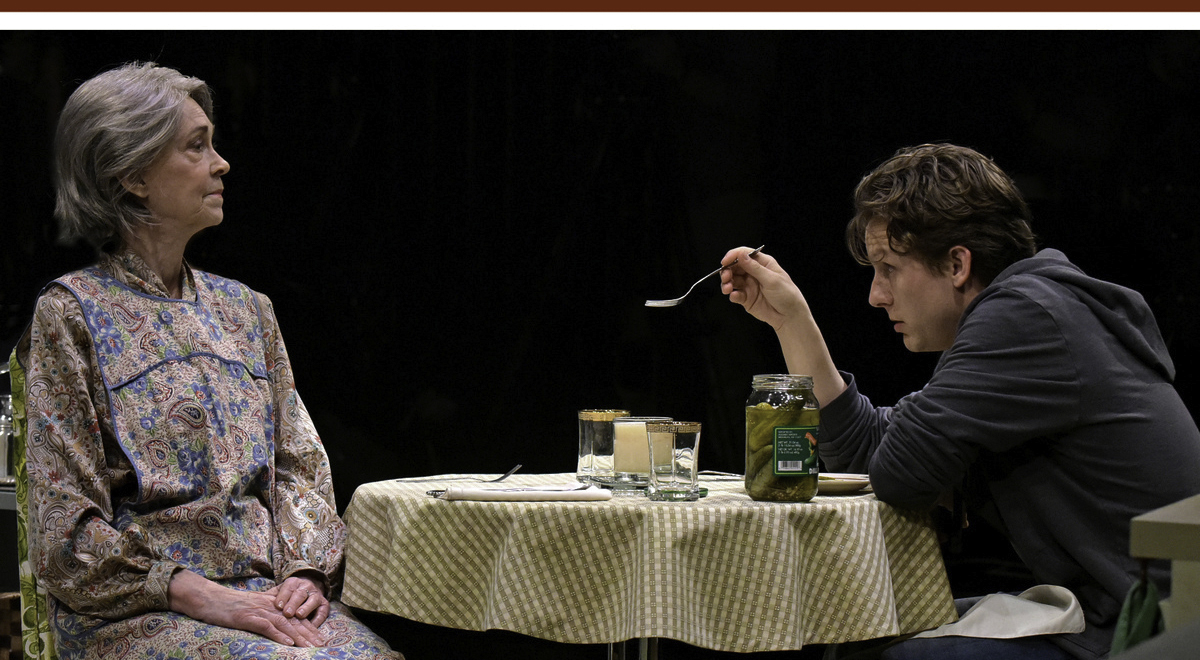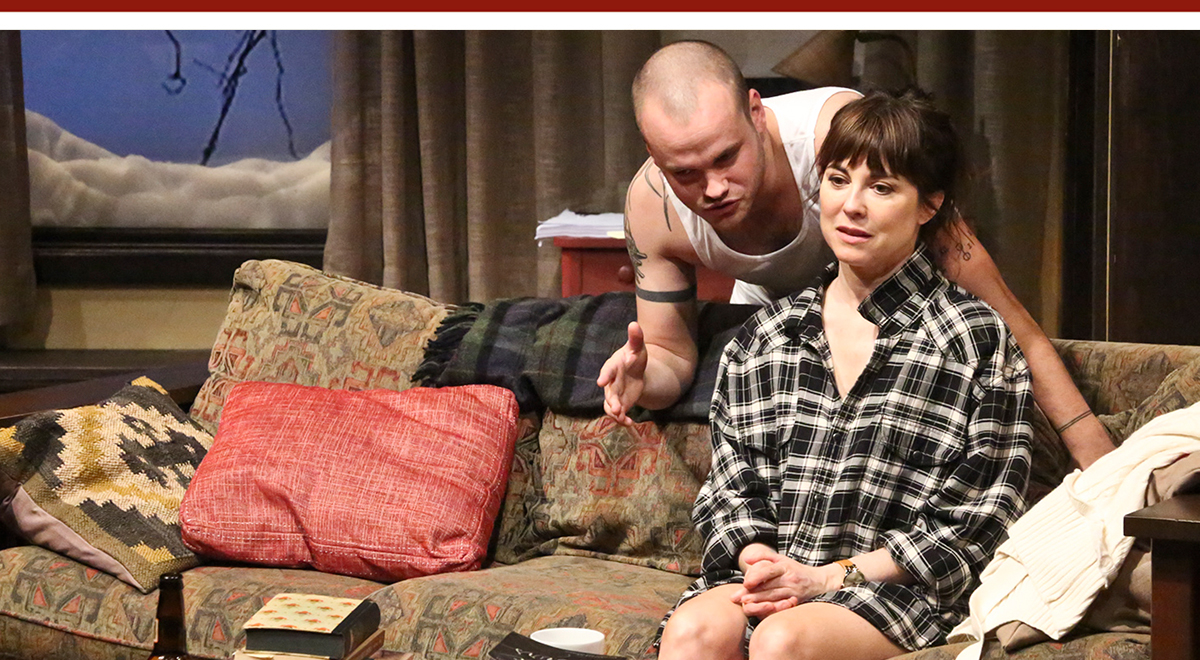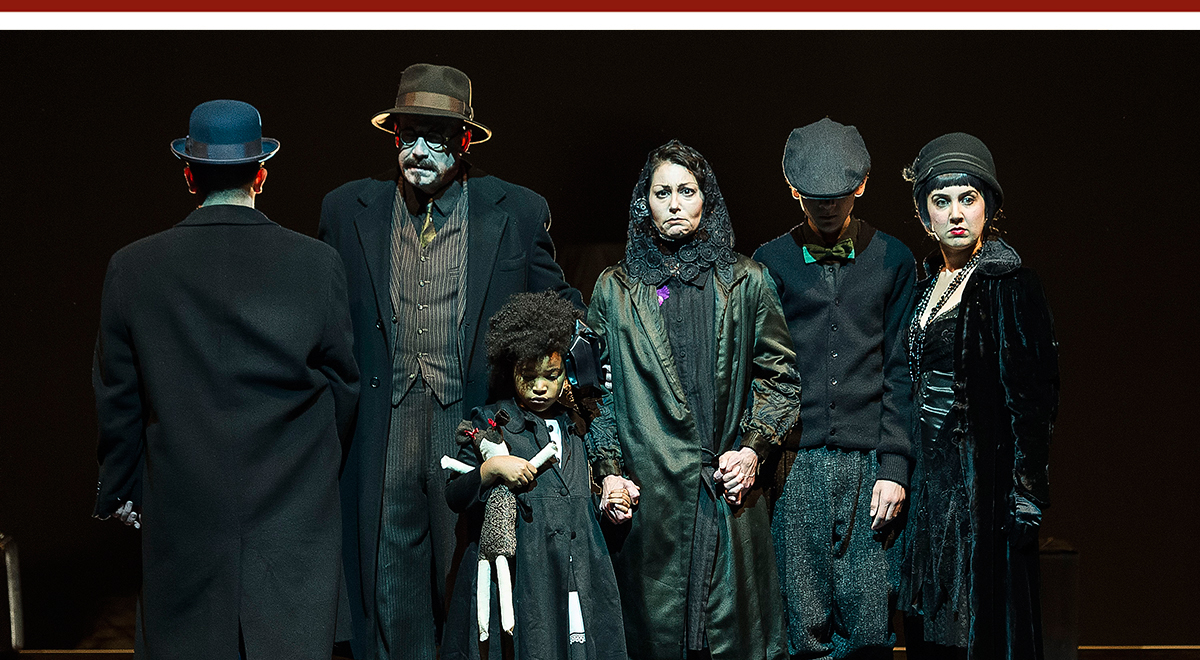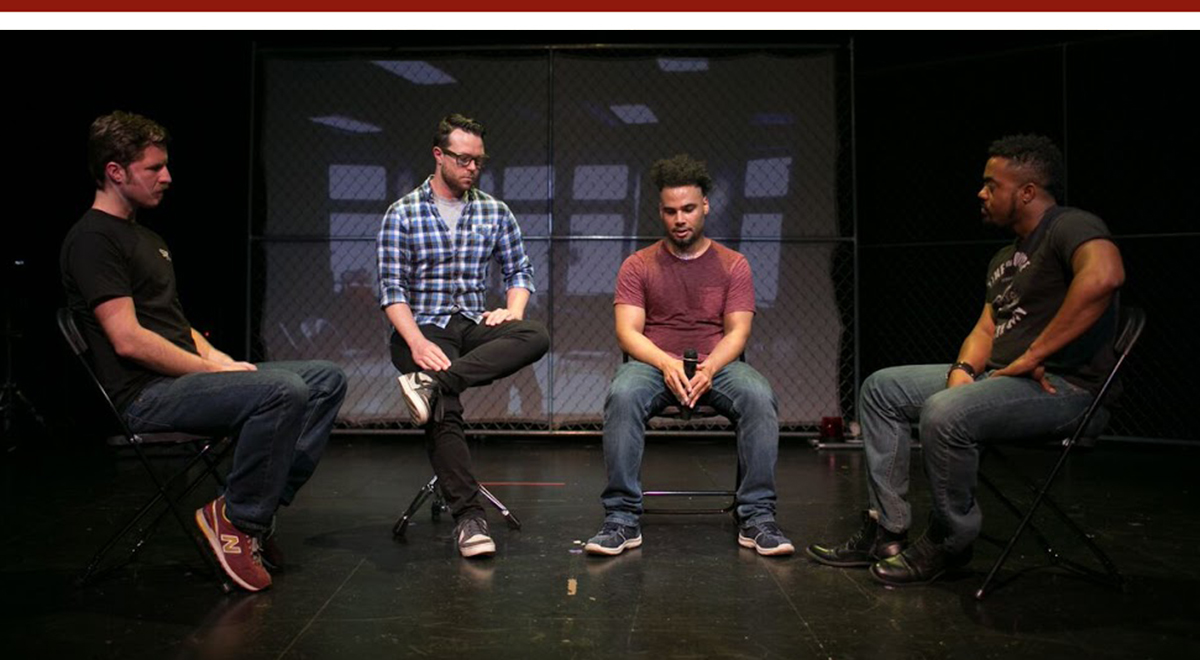APRIL 2016
Click title to jump to review
OFFICE HOUR by Julia Cho | South Coast Repertory
THE REVISIONIST by Jesse Eisenberg | Wallis Annenberg
SEX WITH STRANGERS by Laura Eason | Geffen Playhouse
SIX CHARACTERS IN SEARCH OF AN AUTHOR by Luigi Pirandello, adapted by Robert Brustein | A Noise Within
TELL ME I'M PRETTY by Joshua R. Silverstein | Bootleg Theater
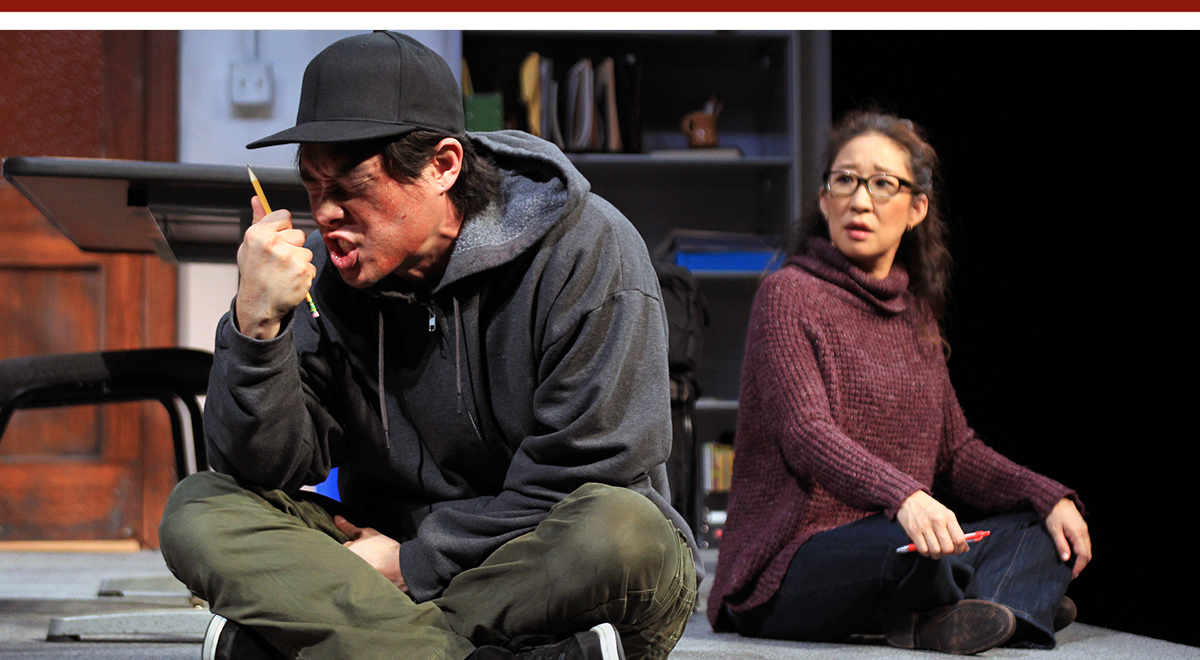
Write and wronged
For the end of Julia Cho’s Office Hour, premiering through April 30 as part of South Coast Repertory's Pacific Playwrights Festival, the audience looks into an empty university office. The three teachers who share it have gone home. However, Cho and director Neel Keller have just taken us down a path where alternate outcomes could have led to another reason why they are gone.
The ambiguity and forks in the dramatic arc are useful. Although the subject of alienated students turning to violence is of urgent concern, the causes are so varied and complicated as to seem unfathomable. Any ending that smacks of denouement and resolution would be a mistake. Complementing the structural ambiguities, Keller and his cast of four have provided the fearless production Cho requires and as a result moved Office Hour beyond stage drama to Art.
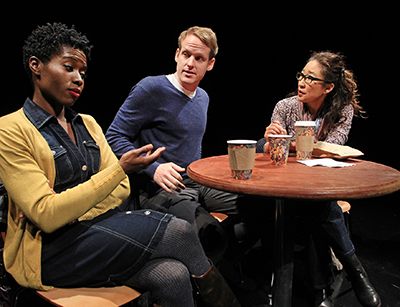
Ms. Cho is writing with even more muscle than she has in the three previous efforts reviewed by Theatertimes. The need for communication has been a subtle presence in all of these, whether between estranged generations in Durango, races and histories in The Piano Teacher, or lovers and linguists in The Language Archive. In Office Hour, however, it takes center stage when a sympathetic teacher senses what's at stake with an alienated student.
In the opening scene, adjunct professors Genevieve (Sola Bamis) and David (Corey Brill) are meeting with Gina (Sandra Oh) to tell her about Dennis (Raymond Lee), a student whose stories of violence, incest and rape along with his shadowy, menacing persona, have disturbed each of their English classes in turn. He is now enrolled in Gina's creative writing class and they think that, while she should be cautious, she should do something to get him off campus. Their message is clear: If ever a student was to telegraph a Columbine, Newtown or Virginia Tech shooting, it's Dennis.
We move to Gina's university office, where she is meeting with Dennis for the first time. Like her, he is an Asian American, but that doesn't provide any advantage in breaking through his stony silence. After several meetings, she gradually gets him to participate in some writing exercises, which cracks open the window into his world. It's when she role-plays his mother calling to check on him, and pushing some obvious buttons, that he explodes, unleashing his pent-up rage. He is intelligent, not a freak, but carrying the overwhelming pain the sensitive stockpile when they become the bullied outsider. He is candid about his gun collecting and explains that all are legal, including the registered handgun he brings to school in his backpack.
The artfulness comes in Cho's storytelling, which Keller brings to realization. The action moves along and then, suddenly, as if a psychological trip wire is triggered, violence erupts and victims fall. Black-out. Lights up. As if the scene had an "undo" function we are back, and walking around that trip wire. The gun does not come out. There is no shooting. We proceed, now aware of how easily a well-meaning encounter can go wrong. There are no answers, and Dennis' case is ultimately not like those who plan to die while slaughtering people around them. But there's a jolt of awareness: what might be done to help ease the future Dennises? How can we, as teachers, parents and colleagues avoid being direct or indirect carriers of alienation?
Ms. Cho has created two meaty roles for Asian actors and Keller has the good fortune to have had Oh and Lee available to play them. Bamis and Brill provide excellent support. Takeshi Kata and Se Oh are the scenic designers, and Alex Jaeger and Elizabeth Harper added costumes and lights, respectively. The beautiful occasional music was composed by Peter Bayne, who also provides the shocking sound effects.
We are left with the feeling that we have just seen both future and past, inevitabilities and alternatives. That the impressions will surely last a lifetime is an achievement of art's highest aspirations. The audience's role is seeing that its message helps more lifetimes last longer.
top of page
OFFICE HOUR
by JULIA CHO
directed by NEEL KELLER
SOUTH COAST REPERTORY
April 10-30, 2016
(Opened 4/15, Rev’d 4/23m)
CAST Sola Bamis, Corey Brill, Raymond Lee, Sandra Oh
PRODUCTION Takeshi Kata/Se Oh, set; Alex Jaeger, costumes; Elizabeth Harper, lights; Peter Bayne, music/sound; Joanne DeNaut, casting; Sue Karutz, stage management
HISTORY Commissioned by South Coast Repertory. World premiere
Raymond Lee and Sandra Oh, top; inset, Sola Bamis, Corey Brill and Oh
Debora Robinson
Intolerance
Jesse Eisenberg's The Revisionist, in a generous production at Wallis Annenberg Center for the Performing Arts, is an exercise in tolerance. Though set in the long shadow of the Final Solution and featuring a Holocaust survivor named Maria, it isn't exploring humanity's capacity for mass brutality but a single individual's selfishness.
That character, and ultimately the production, serve as a test of tolerance for the play's friendship-starved survivor as well as the audience.
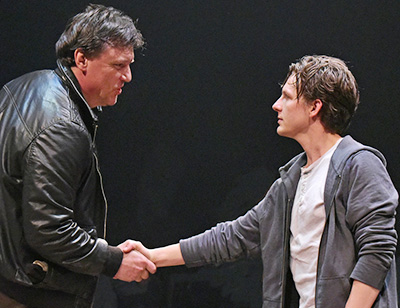
Anticipation is high upon entering the beautiful Wallis Annenberg Center for the Performing Arts in Beverly Hills. This is a facility with ambition and purpose, and after a critically acclaimed 2007 New York premiere that featured Eisenberg and Vanessa Redgrave, The Revisionist is undeniably a wise selection. Inside the 150-seat Lovelace Studio Theater, scenic wizard Tom Buderwitz has fitted a detailed three-room set into the railcar-narrow stage that stretches between facing banks of seating.
Maria (Deanna Dunagan) is desperate to connect with any member of a family whose members, if not exterminated in the 1930s and '40s, fled to America. The pain of fleeing a country is underscored and brought up to date in a CNN report on the current Syrian refugee crises that plays quietly during pre-show and continues when lights rise on Maria, sitting anxiously when a knock at her door signals the arrival of David (Seamus Mulcahy).
Loss and loneliness have toughened her, and after welcoming him she soon rebukes him for being several hours late and not calling. His excuse is weak yet acceptable, but given more to shut her up than soothe her. Such behavior will soon prove part of a pattern. David, a published novelist in his twenties, wants to spend an undisturbed week here revising a manuscript. Maria, a distant relation, hopes to get to know him and spend time together.
He makes it clear he will be very busy and doesn't expect to have much free time.
Through the wall-less rooms of Budewitz' set we see David when he thinks he's alone. Clearly undisciplined, he blows quick hits of pot out the window and listens to music. The writer's block he fled back home has followed him here. Yet, he continues to insist he has no time to spend with Maria. He also snubs Maria's friend Zinco (Illa Volok), a man in his 30s or 40s who gives her free cab rides to the market and dotes on her in an unrestrained mother transference David finds especially creepy.
This is the dynamic that plays out. We learn little about David aside from his hunger for recognition as a writer. We do get plenty of evidence that he has personal selfishness on the magnitude of a black hole. At one point Maria lets slip some highly personal information about the true nature of her family connections with David. His response is to talk about another writer's success, which he felt was undeserved. This, coupled with awareness that he is wasting his time, is too much for her. She calls on Zinco to whisk him to the airport days before his scheduled departure, with tickets she already changed for a flight within hours.
Director Robin Larsen and Mulcahy may have exacerbated the David problem by failing to soften his brusqueness. In New York, Eisenberg played the part and perhaps his ability or his celebrity provided something to root for. As it is, his part of any conversation is so wearying that the extended exchanges between Maria and Zinco, all in Polish, are among the most enjoyable in the show.
The production is lovely and credit goes to Larsen's design team of Jocelyn-Hublau Parker (costumes), Leigh Allen (lights), and John Zalewski (music and sound). Allen has a couple of special gobo-cues that make the floor appear to show light through the slats of a railcar. Perhaps it's a suggestion of the imprisonment both characters are in. Perhaps it's just another shadow of genocidal cruelty. Unfortunately, so much needs to be made clearer.
In the published script, Eisenberg provides the CNN text used in the premiere. That report was on the World Trade Organization's vote to admit Vietnam in 2006. That would have dated the play if used now. But it may have been meant to remind us of the importance, perhaps inevitability, of forgiveness.
top of page
THE REVISIONIST
by JESSE EISENBERG
directed by ROBIN LARSEN
WALLIS ANNENBERG CENTER FOR THE PERFORMING ARTS
March 29-April 17, 2016
(Opened, Rev’d 4/1)
CAST Deanna Dunagan, Seamus Mulcahy, Illa Volok
PRODUCTION Tom Buderwitz, set; Jocelyn-Hublau Parker, costumes; Leigh Allen, lights; John Zalewski, music/sound; Beth Lipari, casting; Elle Aghabala, stage management
HISTORY World premiere in February 2013 by Rattlestick Playwrights at Cherry Lane Theatre, directed by Kip Fagen with a cast of Vanessa Redgrave, Dan Oreskes and the playwright
Deanna Dunagan and Seamus Mulcahy, top; inset, Illa Volok and Mulcahy
Kevin Parry
Whodunit?
Snow has banked above the windowsills. A beautiful woman sits reading on the sofa of a large house when car headlights suddenly sweep the frozen panes. The engine dies. There's the crunch of approaching footsteps; a forceful knocking on the door. A brusque man enters, claiming to have reserved a room.
Laura Eason’s Sex with Strangers, now at the Geffen Playhouse (through April 10) in a well-realized staging by Kimberly Senior, begins with all the hallmarks of the classic pulp thriller. The first impression is deceptive, however. SWS is a page-turner sans pages, a whodunit concerned with authorship in the age of Internet anonymity. But it goes further, raising questions about romantic and professional relationships in an era of transition from real to virtual and paper to pixels.
Olivia (Rebecca Pidgeon) is a youngish member of the older order. Still bound to paper publishing, she has let herself slip into a drowsy teaching tenure after modest success as a novelist. Ethan Kane (Stephen Louis Grush) is a savvy navigator of e-publishing and social media promotion. He has achieved remarkable success as a blogging sex-diarist named Ethan Strange, and is now writing the film adaptation of his sequential New York Times bestsellers, Sex with Strangers and More Sex with Strangers. The Strange name is the only fiction. With few exaggerations, the steady stream of conquests chronicled in the SWS books are Kane's actual experiences. Now, reaching the end of his twenties, he wants to build a solid reputation for real writing and relationships. He will, perhaps too easily, convince Olivia to help him achieve both as a partner.
It is quickly clear that the reason Ethan has chosen to work on his screenplay here in this remote north Michigan retreat is that he knew Olivia was there. A mutual friend tipped off Ethan to this regular getaway from Olivia's Chicago. He has read her book – twice – and feels she is a major talent that must publish again. That she is proofing her own over-gestated next novel is even more tempting than she is. Though she forbids him access to sheets of the manuscript, her bed sheets are quickly – perhaps too quickly – parted. While she's in post-coital dreamland, he quickly devours the draft. His powers of persuasion are as strong as his skill at seduction, and he flatters away her rage when she learns what he has done. He convinces her to meet with an agent he recommends and her book is soon earmarked for publication. Meanwhile, an app he is designing to promote authors is how he hopes she will introduce what will certainly be a major release.
Eason is interested in how these characters behave as people, beyond their identities as writers, and most importantly how honest they are with themselves. Olivia and Ethan will embark on a surprisingly open and successful relationship for over a year. But Ethan's alter ego will lead to estrangement and they will go their separate ways, with Olivia now back on top and Kane harboring resentment that he was used. That Olivia understands herself less than her characters is suggested in the play's final moment, as she stands immobilized in fading light and indecision. Will she go back with Ethan or proceed with someone more reliable – and less exciting. A fitting "what happens" ending for this modern "whodunit."
Grush is a Steppenwolf actor who was part of Eason's first script development at the Chicago theater company in 2009 and its premiere in 2011. He knows Ethan the way an author knows a character. Pidgeon, too, knows Olivia as well as how to slyly invoke suspense, having been in numerous genre films and plays, notably The Spanish Prisoner with Steve Martin.
Scenic designer Sibyl Wickersheimer, with her solid string of remarkable sets, manages to outdo herself here, filling the Skirball auditorium and reminding what a special environment this flexible space can become. Lighting is by Joshua Epstein, costumes by Elisa Benzoni, and sound by Cricket S. Myers. Phyllis Schuringa was in charge of casting and Julie Haber is production stage manager.
top of page
SEX WITH STRANGERS
by LAURA EASON
directed by KIMBERLY SENIOR
GEFFEN PLAYHOUSE
March 6-April 10, 2016
(Opened 3/9, Rev’d 4/2)
CAST Stephen Louis Grush, Rebecca Pidgeon
PRODUCTION Sibyl Wickersheimer, set; Elisa Benzoni, costumes; Joshua Epstein, lights; Cricket S. Myers, sound; Phyllis Schuringa, casting; Julie Haber, stage management
HISTORY Developed through Steppenwolf Theatre's First Look Repertory of New Work in 2009, with Stephen Louis Grush as Ethan, and premiered there in January 2011 (with Grush and Sally Murphy). The New York premiere opened at Second Stage Theatre in July 2014, directed by David Schwimmer with Anna Gunn and Billy Magnussen.
Stephen Louis Grush and Rebecca Pidgeon
Michael Lamont
Asylum seekers
If the actor's nightmare is forgetting lines during a performance, a playwright's might be watching a misguided adaptation sabotage his or her work. In 1921, Luigi Pirandello took up the case of a third category of theater "artist," the dramatis personae, creating a nightmare scenario in which six characters have been set adrift when the author fails to finish their play.
Six Characters in Search of an Author, now at A Noise Within (through May 14), gives new meaning to being off book. Their play's unseen creator, in a faint echo of mankind's, set them up for a fall by setting them into a melodramatic world of temptation, then aborting the story and launching them on an endless quest for resolution. Founding Artistic Directors Geoff Elliott and Julia Rodriguez Elliott direct this fine introduction to Pirandello's work using the highly adaptive adaptation by Robert Brustein, introduced in 1988 and revised in 1996.
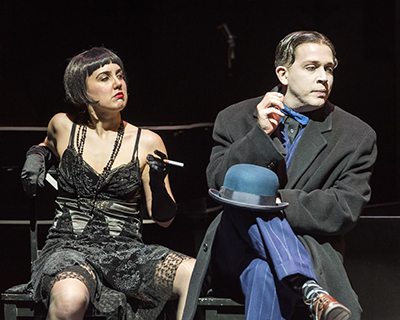
At rise, the stage is in work light and the actors out of character. Addressing each other by name, they reveal that the play's directors are away on artistic director duties and so company member Robertson Dean is running this rehearsal for an upcoming production of Thornton Wilder's Our Town. No one is excited about the old chestnut. With stage manager Natalie Reiko at the rehearsal table and production assistants Carina Haller, Marcos J. Ruiz and Kathryn Ventress standing by, Dean asks Susan Angelo and June Carryl to pick up with a scene in the third act, with a third actor, Abubakr Ali, observing.
Brustein's version was tailored to his own American Repertory Theatre in Cambridge. His "old chestnut" was The King Stag, an established ART crowd-pleaser. But he makes it clear he wants to share authorship with each theater that mounts his adaptation. "This version is meant to be liquid, spontaneous, improvisatory, adaptable," he writes in his introduction. "Treat it as loosely as I have treated the original text."
In Our Town, the Elliotts have a subliminal reminder of locality, but more importantly it allows much deeper resonance. While Brustein describes Stag as "a fairy tale [where], as in all the best fairy tales, everything ends happily ever after," Wilder's final act is set in a hilltop cemetery overlooking the town where a young woman has recently joined the ghosts. Wilder's rumination on life and loss helps deepen the role of Pirandello's castaway characters.
The characters are a family, with Mr. Elliott as the father and leader, Abby Craden as "Mother," Alison Elliott as "Stepdaughter," Rafael Goldstein as "Son," Jack Elliott as "Young Son," and Rigel Blue Pierce-English as "Young Daughter." Dean politely asks the intruders to leave but the Father begs to be able to just tell their unfinished story. Perhaps these theater people, so familiar with plotting, can help them resolve what, without a conclusion, threatens to remain infinitely endless. The actors begrudgingly relinquish the stage and we are soon immersed in a conflicted tale of sex, betrayal and death.
The actors all fit their assignments well, with the elder Elliott adding an interesting character to his gallery, and Mr. Goldstein continuing to impress with his range. Frederica Nascimento's set transforms from the rehearsal world to that of the play, with the help of Tom Ontiveros' lights and Robert Oriol's original music and sound design. Costumed by Jenny Foldenauer, with hair and makeup by Danielle Richter, to recall the Pirandello's 1921 Italy, there's an unmistakable echo of real people searching for permanence in America.
This is another winning production by ANW, one with the potential to gain sufficient popularity to someday become the "old chestnut" that is the play within its own play. That would really up the ante on Brustein's concept.
top of page
SIX CHARACTERS IN SEARCH OF AN AUTHOR
by LUIGI PIRANDELLO
adapted by ROBERT BRUSTEIN
directed by GEOFF ELLIOTT " JULIA RODRIGUEZ-ELLIOTT
A NOISE WITHIN
March 27-May 14, 2016
(Opened 4/2, Rev’d 4/3m)
CAST Abubakr Ali, Susan Angelo, June Carryl, Abby Craden, Robertson Dean, Alison Elliott, Geoff Elliott, Jack Elliott, Rafael Goldstein, Rigel Blue Pierce-English, Natalie Reiko, with Carina Haller, Marcos J. Ruiz, Kathryn Ventress
PRODUCTION Frederica Nascimento, set; Jenny Foldenauer, costumes; Tom Ontiveros, lights; Robert Oriol, music/sound; Danielle Richter, hair/wigs/make-up; Samantha Sintef/Emily Burst, stage management
HISTORY
Rafael Goldstein, Geoff Elliott, Rigel Blue Pierce-English, Abby Craden, Jack Elliott and Alison Elliott, top; inset, Elliott and Goldstein
Craig Schwartz
Peacock proud
The title of Joshua R. Silverstein's one-person stage show, Tell Me I'm Pretty, points to the psychological irony that drives the piece. Bravado fueled by insecurity is a mainstay, a man-stay, that pushes people to overcome fear and show the world they deserve some respect, some credit, perhaps even some applause. Silverstein's energetic and comedic carousel of observational vignettes does earn him all three.

He is in good hands with director Diana Wyenn, who helps vary the pace so that Silverstein gets the right showcase for his talents and perspective. The theme is that of the serial outsider, whose bi-racial dual ethnicity is acknowledged in his opening statement, which abruptly challenges the audience to embrace the seeming incongruity of a black Silverstein, or be labeled racist. The premature push back is sarcasm, and both odd and anachronistic given the ethnically mixed, overwhelmingly young crowd. But behind the quick, rebounding smile, we know is a "Best Defense is Offense" posture that has been earned. As the son of a white Jewish man and an African-American woman, Silverstein has dual citizenship in the victimhoods of prejudice.
But his perspective isn't just from the receiving end of bigotry. He also seems to have fallen into a 'tween generation, signaled in a pre-show soundtrack that swings between '70s songs and contemporary tunes, and sustained through good-natured mocking of the old and new. The lingering strains of timeworn segregation and racism are obvious targets. But while the elders are ribbed for technological ineptness, 16-year-olds are smacked for listening to "terrible" music, and he's more alarmed by social media overreach and Facebook and search page marketing that instantly throws up ads for merchandise and services we just Googled or Binged elsewhere.
One of Silverstein's routines is a Top 20 list of names for his particular racial convergence. It's one that feels labored and stretched thin, which happens a couple of times, especially during long stretches mixing sound effects and beat-box rhythms. These wear out their welcome fairly quickly, which is odd given the great trio of musicians he has supporting him: Damien Curry (guitar), Gerry Doot (drums) and Erik Hallsey (bass). Any time they get the floor the show gets lift. They even fill in as fellow attendees of a "Small Parts Anonymous" meeting, which given Silverstein's challenges to get decent acting roles might have taken a higher road. Instead, member linkage lies below the belt.
But Silverstein is winning and the essence of his theme is worth rooting for. There are a variety of subjects covered, but they divide between those about himself and his struggles and those that make the case through more objective portraiture. These are the strongest. His acting chops get a workout in a couple of character sketches of neighbor's from his L.A. neighborhood. These are areas that could deepen and expand to better impress both audiences and casting directors.
One segment, supported by images in Matt Hill's video design, is a salute to bi-racial people, including President Obama, Halle Berry and England's Idris Elba, but not Jamaica's Bob Marley – who is mentioned elsewhere during the evening. Another face, coincidentally, from the same mix, is Lenny Kravitz, whose African-American actress mother, Roxie Roker, was half of the groundbreaking interracial couple on "The Jeffersons," one of the half-dozen historic shows created by Norman Lear, whose name is among those listed as supporters of Tell Me I'm Pretty.
A lingering image is Silverstein's peacock stance, a pose he strikes several times during the show. Arms shoot up, chest puffs out, and his face is now confidently expressionless. It is his frozen end-zone dance, a signal that beauty and pride come from inside.
top of page
TELL ME I'M PRETTY
written and performed by JOSHUA R. SILVERSTEIN
directed by DIANA WYENN
BOOTLEG THEATER
April 8-May 7, 2016
(Rev’d 4/23)
MUSICIANS Damien Curry (guitar), Gerry Doot (drums) Erik Hallsey (bass)
PRODUCTION Diana Wyenn, set; Joey Guthman, lights; Mark Holden, sound; Matt Hill, video; Aaron Saldaña, stage management
HISTORY World premiere


